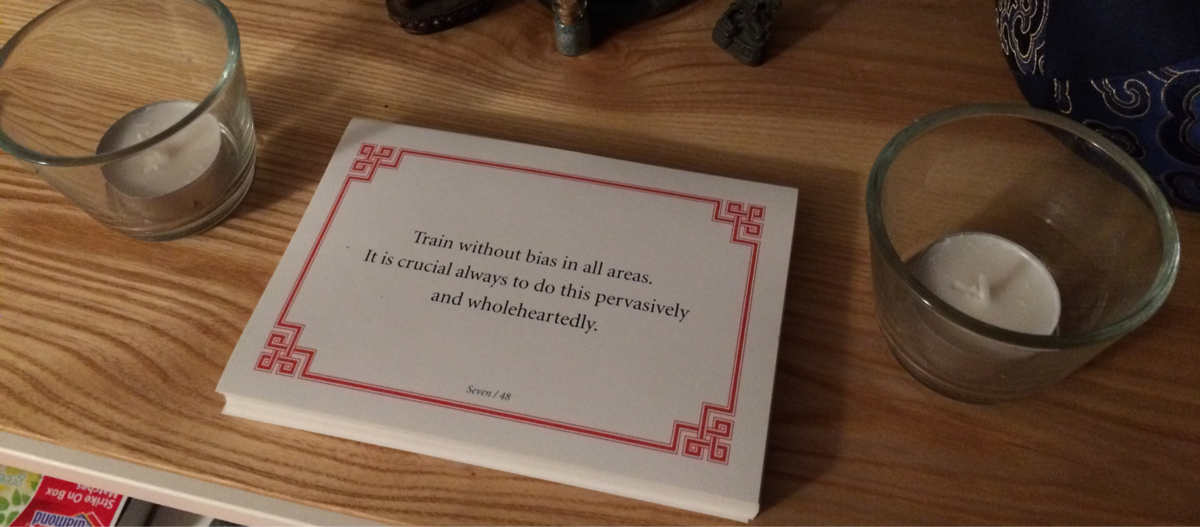Lojong Pactice Journal: Train without bias…
The 59 slogans through a social justice lens
I am guilty of thinking of meditation as something I could only do when things ‘weren’t quite so bad’. I am equally as a guilty of only meditating when my circumstances have been challenging, and then quitting once I felt better. Out of laziness, fear or apathy, I have waxed and waned in my practice over the years — considering it important at some times and less so at others.
This slogan calls us to see that practice is not something we can put on a shelf. Whether we like it or not, we are participants in life, not bystanders, and practice is not confined to specific times, places or states of mind. Practice is not simply sitting on the cushion each morning, or — if Buddhism isn’t your spiritual path — praying a certain number of times a day, visiting a particular building each week or lighting candles in a particular sequence.
Practice is how we live our life. It’s how we integrate teachings we hear into all aspects of our life so that we may be of benefit. It’s not something that’s only applicable in certain situations or settings. It’s how we orient ourselves towards liberation and justice every day.
Practice happens when we are experiencing a conflict at work or with our family. Practice happens when we’re stuck in traffic. Practice happens when we have diarrhoea at three am. It also happens when we are watching the most stunning sunset, or when we hold a newborn child or say “I do” to the person with whom we want to adventure through life. Practice can be done while we’re doing the dishes, taking out the bins and mowing the lawn.
To train without bias pervasively is to train in mindfulness, equanimity, generosity, patience, discernment and compassion in any given situation — not just when we think we are ready or when we are suffering and looking for an escape.
This may seem an arduous task, but this is also why it’s called ‘practice’. It’s something we come back to again and again, in any given situation. The more we do, the more habitual it becomes. As Shantideva says:
There is nothing that does not grow lighter with habit and familiarity.
As we start out as practitioners we could become disheartened to see how much we vacillate or berate ourselves, how often we go unconscious and cause harm or how deep our neurosis runs. But the more we practice the less of a burden it becomes, especially as we see how practice can be applied to all areas of our lives, without bias.
Originally published on Medium.
This is part of a series of posts I did to support my practice. They will always be free for everyone to read and engage with, but if you want to support me financially, that is greatly appreciated. Tips, paid subscription, and regular e-transfers* help me cover the costs of being a creative human being in the world.
Toodle on over to www.KSCHatch.com to find out more about what I do.
Thank you!
*If you are in Canadia, you can send me a one off or ongoing e-transfer using the email faunawolf ‘at’ gmail ‘dot’ com
Lojong Practice Journal Index
The following is an index of my commentaries on the Lojong Slogans (also known as the Seven Points of Training the Mind) in the order they are listed, rather than the order in which I published them. May they be of benefit. ~ Point One: The preliminaries and therefore basis of the practice






This is one of the slogans that has a second sentence. It might easily just have been: "Train without bias", like with the previous: "Take on the three principal causes", which is short and needs to be unpacked when you meditate on it. But no. Here we get further instructions: "It is crucial always to do this [= train without bias] pervasively and wholeheartedly." Maybe training without bias is a real challenge and we get it often wrong. Which would mean that we usually train with bias. What could that mean? Maybe we are compassionate only with the people we like? Maybe we are compassionate only when we're not soaking wet? Maybe we're compassionate only on alternate Sundays? Maybe we only practice the pleasant slogans that bolster our ego?
I think one of the most useful lectures I got was that meditation isn't the most important part of my spiritual life, it is in post-meditation that the real work is done. I find the term very helpful because if one has the pair "meditation - everyday life" then the two are separated. Once you realise that there is no real distinction between "meditation" and "everyday life" things become actually easier. One can practice always, become aware always. To me, meditation is a break from post-meditation. I don't mean that to sound lofty. It is just that I don't often meditate formally. I've been through the "I should, I should"-phase but I've realised that post-meditation is also a valid place for practice. Maybe seeing meditation as something special is also a form of bias. In the end, it is how you live every moment that is important.